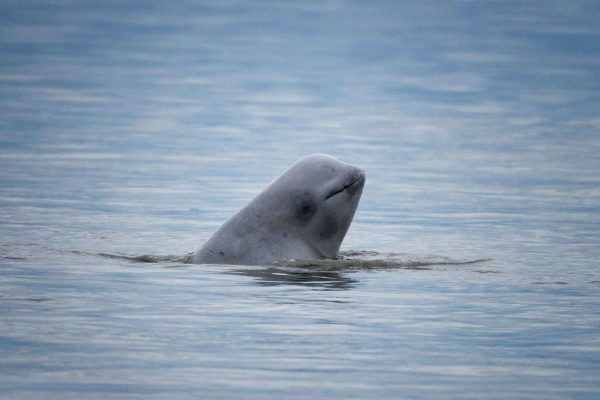
A federal permit allowing Hilcorp to drill in Cook Inlet does not account for the harm vessel noise could pose to endangered belugas there, according to a decision yesterday from a District Court judge.
Cook Inletkeeper and the Center for Biological Diversity challenged the permit in a 2019 lawsuit. This week, Judge Sharon Gleason sided with them, ruling NOAA Fisheries did not account for how noise from Hilcorp’s tug boats would cause harm to belugas when it authorized the company to work there.
Bob Shavelson, advocacy director at Cook Inletkeeper, said the decision touches on one of many impacts Hilcorp’s activities have on local wildlife.
“This decision clearly shows that the National Marine Fisheries Service is not doing an adequate job at protecting our marine resources,” he said.
The Marine Mammal Protection Act requires those involved in offshore oil and gas production to obtain special authorization for harming local marine life, known as “incidental take,” as long as its impact on wildlife is negligible.
Hilcorp received that authorization from NOAA Fisheries in 2019 for its five-year plan to explore and develop Cook Inlet.
But in its own recovery plan for the endangered species, NOAA says noise from tug boats is a threat to beluga whales. That’s partly because belugas rely on echolocation to find food and communicate with each other. Whale researchers have also previously voiced concern over Hilcorp’s use of air guns in Cook Inlet when exploring there.
The judge’s decision requires the parties involved to propose remedies to the noise problem from tug boats within 14 days of the March 30 order. Shavelson said Inletleeper will be in touch with its lawyers to decide what to propose.
“There’s so many different impacts affecting the Cook Inlet beluga whale,” he said. “It really is that death by a thousand cuts. And some things, like climate change, are a lot more difficult to get a handle on. But we know that pervasive ship noise, seismic air guns, toxic dumping — we know those things are having a negative effect on beluga whales, so we should reduce and eliminate them where we can.”
The court did uphold part of NOAA’s ruling, regarding mitigation measures for seismic surveying around belugas.
Representatives from NOAA Fisheries and Hilcorp declined requests for comment.
Hilcorp is currently the biggest producer of oil and gas in Cook Inlet. The Texas-based company owns several federal lease blocks in the inlet and is planning for a geohazard survey on some of those tracts this summer.




